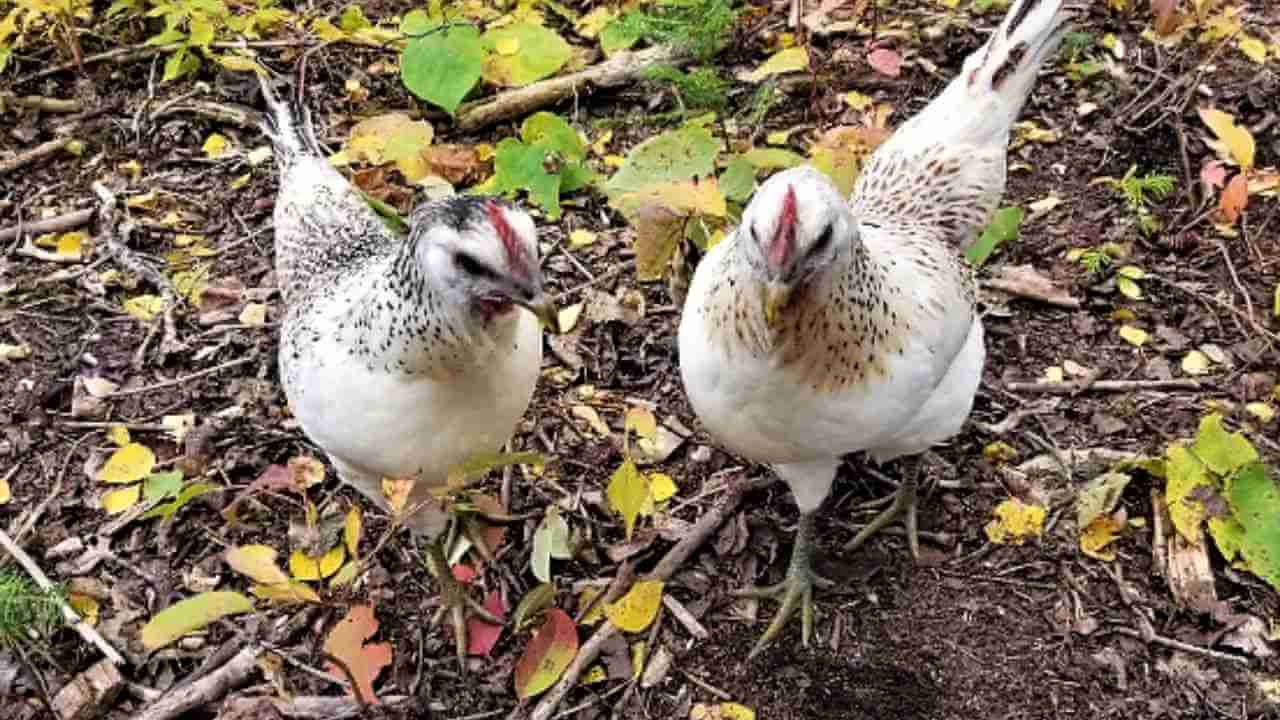Mosaic chickens are a rare and new variety of chickens that are quite famous for their unique appearance. These chickens are a mix of different fibro melanistic breeds like Ayam Cemani, Silkie, Ulikba, etc, resulting in most of their body parts being black.
They are hardy, active birds and can sense threats and predators; this uniqueness sets them apart from others. These Chickens often have a distinctive blue hue to their comb and earlobes, adding to their fascinating and beautiful look.
Let’s dive to their full profile:
Overview of Mosaic Chickens
| Origin | USA (disputed history about the origin) |
| Skin Color | Deep blue skin |
| Feather Color | Black, white, yellow, blue, and various patterns |
| Average weight | 6-8 lbs |
| Average Lifespan | 4-5 years |
| Bird Size | Medium |
| Eyes | Reddish to black with dark surrounding skin |
| Comb and Wattles | Dark red comb and wattles |
| Comb Type | Single |
| Distinct Feature | Mosaic feather pattern and turquoise earlobes |
| Beak | Mostly black or yellow with grayish shades |
| Temperament/Personality | Calm and gentle |
| Noise level | Moderate |
| Eggs Laying Age | 5 to 6 months |
| Egg Color | Cream |
| Egg Size | Medium |
| Egg Lays | 200 – 250 eggs per year (3-5 per week) |
| Broodiness | Not broody or rarely |
| Weather Tolerance | Heat-hardy |
| Confinement Tolerance | Good |
| Ability to Sense Threats & Predators | Great |
| Registration | Not officially recognized as a breed |
Where Did These Pretty Yard Birds Come From?
In the early 2000s, the folks at Gold Feather Farms decided to play chicken matchmaker. They crossed breeds like Ayam Cemani, Silkie, and maybe even Hmong or Dorking. It’s all a bit of a secret, with some speculation.
The result? A new variety with blue earlobes, blue skin, and a downright dazzling mosaic pattern. Each chick is a surprise, like opening a potluck-shipped egg gift!
The creator, Gold Feather Farms, gets all the credit. This farm in the United States built a breed from scratch, aiming for aesthetics and practicality. But here’s the tea: some say there’s been conflicting info and shady practices with sick chicks early on.
I’ve had chats in a Facebook group with the original breeder, and they swear they’ve worked out the kinks. Still, it’s a question worth asking when picking your breeder.

The Temperament of Mosaic Chicken
Mosaic chickens are gentle, calm, and friendly birds. They tend to enjoy the company of humans and are also harmless to your kids.
They are active and socialized chickens so it’s important to socialize them with their flock and other breeds, otherwise they may die of loneliness. As they are calm and gentle by nature, they must be careful when they meet or mingle with other aggressive breeds.
Mosaic chickens are very alert and have a keen sense of detecting and deflecting predators or other threats. They are also great free-rangers. They love to explore their surroundings and search for food.
With low-moderate aggression toward flock members and a moderate noise level, they’re perfect for backyard farmers or small-scale farmers. Honestly, their intelligence surprised me!
Mosaics are good foragers too, loving a free-range life. Their foraging ability is moderate-good, which saves feed. They’ve also got moderate predator evasion skills, but still build the barn tight.
Bonus: They’re disease-resistant with standard care, so keeping them healthy is a breeze.
The Appearance of Mosaic Chicken
These medium-sized large fowl are pure eye candy. Hens tip the scales at 5 pounds, while roosters hit 7 pounds. Their striking plumage mixes white, black, and red into a mosaic-like appearance.
Add a single comb, bright red wattles, and that fibro color (yep, those blue lobes), and you’ve got pretty yard birds that scream exclusive. Here are more details:
- Feather
Mosaic chickens have a frost white to black color of feathers with patches of iridescent feathers which makes them wonderful.
- Skin
Mosaic chickens have deep blue skin, which is because of the breeds from which they develop like Ayam Cemani, Silkie, Kadaknath, Hmong, and Ulikbas.
- Weight
On average they weigh between 6-8 lbs.
- Size
They are medium-sized birds.
- Comb and Wattles
These chickens have a dark red comb and wattles.
- Earlobes
Mosaic hens have bright turquoise earlobes.
- Beak
The beak of a mosaic chicken is mostly black or yellow, with greyish tones.
- Legs and Feet
They have black legs and feet.
- Eyes
The eyes of mosaic chickens are reddish to black with dark surrounding skin.
| Last but not least, each mosaic chicken is different from the others, it’s difficult to find mosaics with the same patterns and colors. |

The Lifespan of Mosaic Chickens
The lifespan of a chicken depends on several factors like their diet, environment, health, relationships, etc.
However, on average a mosaic chicken lives 4-5 years, you can extend this by providing well-formulated feed, a suitable environment, proper management, and proper health care.
Is Mosaic Chicken a Registered Breed?
No, mosaic chicken is not officially a registered breed, there is currently no organization that has been shown to register this particular breed.
Disappointingly, this breed has not been registered yet, but we hope that one day this will be a separately registered breed.
Is Mosaic Chicken Broody?
Broodiness is when a hen sits on her eggs to incubate and hatch them. Mosaic chickens are an uncommon breed of chickens and are not known for their broodiness, as they are not broody or moderately broody.
This means if you have Mosaic chickens, you will need to collect the eggs yourself and incubate and hatch them artificially in the incubator.
Laying Capacity of Mosaic Chicken
Mosaic chickens are also famous for their prolific egg-laying ability, they start producing eggs at the age of 5-6 months. They produce between 200-250 eggs per year meaning 3-5 eggs per week, which are medium in size and cream colored.
You can collect their eggs for incubating and hatching if you want chicks as they are not broody or rarely broody. You can also sell their eggs. Stress-free environment, proper diet, good health care, and friendly, calm friends will boost egg-producing capacity.
Plus, their darkish meat is flavorful if you’re into meat production. Not the best, but decent for a small farm.
The Requirements for Mosaic Chicken
If you want to raise and keep mosaic chicken, you will need to keep in mind some of their requirements so they live long and happily.
But if you cannot afford to keep them free and need to confine them, make sure you dedicate three square feet of space per bird. Usually, the more, the merrier.
-
Understand Mosaic Chicken
As they are a unique breed, you don’t know what they need and what they don’t, try to understand their nature, behavior, and personality so you will know their needs.
-
House Management
A well-created and predator-proof coop will ensure the comfort and protection of your chickens. Ensure to have soft and fine nesting boxes and rods for resting or sleeping in the house. Warming their coop is necessary in cold weather so they will prevent most health problems.
-
Optimum Diet
Offer well-formulated feed to your mosaics and ensure that the feed is full of proteins, lipids, minerals, carbohydrates, and vitamins, as these are crucial nutrients.
Ensure that they have access to clean and fresh water, you can offer water in a waterer and feed in the feeder and place it a few inches above the ground. Also, add fruits and vegetables to their diet as they help to keep your mosaic chicken fresh and healthy.
-
Dust Baths
Dust baths are beneficial for chickens; they remove parasites and mites from chickens and keep them active and happy. Chickens love to do dust baths, so you need to provide dry and clean soil or sand in their surroundings so they can easily do their loving activity.
-
Proper Health Care
Regular health checkups are necessary as birds are susceptible to many health problems. Always looking for signs of illness or any disorder and contacting a veterinarian for that health problem will ensure their well-being, productivity, and longevity.
-
Provide Enough Space
Make sure to provide enough space for roaming, dust baths, and other activities. Mosaic chickens are good foragers; they need enough space to explore and find food to feed themselves.
Conclusion
Are they worth it? Heck yes! These beautiful birds blend diversity, color, and disposition into one awesome package. Sure, there’s speculation about their composition, and some parents throw weird offspring.
But with the right breeder quality and information, you’ll love them. Grab some, watch them strut, and enjoy the facts.
FAQs
What Is a Mosaic Chicken?
A mosaic chicken is a special type known for its beautiful, colorful feathers that look like a mosaic pattern, think white, black, and red mixed! They have cool features like blue skin and turquoise earlobes, making them unique. Mosaic chickens come from selective breeding, started by Gold Feather Farms in Louisiana in the early 2000s. They’re medium-sized (hens weigh about 5 pounds, roosters about 7 pounds), friendly, curious, and excellent at finding their food.
Are mosaic chickens perfect for beginners?
Yes, in my opinion, they are perfect for beginners or newbies as they don’t want any special care or ample space and give you a lot of eggs and joy.
Are mosaic chickens aggressive?
No, they are gentle, calm, and friendly birds. They love to play with humans and their chicken friends.
What is the color of mosaic chicken eggs?
They produce cream-colored eggs.
How many eggs do mosaic chickens lay?
Mosaic chickens lay around 200-250 eggs.
Where can I buy mosaic chicken?
They are hard to find because of their rarity, Mosaic chickens are available in some farms:
- Gold Feather Farm
Sells mosaic chickens, their chicks, and their eggs.
- Open Gate Poultry
Selling mostly grown chickens.
What is the price of mosaic chicken?
The price of mosaic chicken ranges from $25 to $40 or more, and it is not fixed. The price depends on many factors (age, health, area, etc.).
Hello! I’m Ibrahim, the owner and writer of this blog. I run a chicken farm with 160 chickens, and I’ve gained a lot of knowledge about raising and caring for them. Now, I want to share my insights and experiences with you to help you in chicken keeping.


5 thoughts on “Mosaic Chicken Breed | Chickens That Looks Painted”